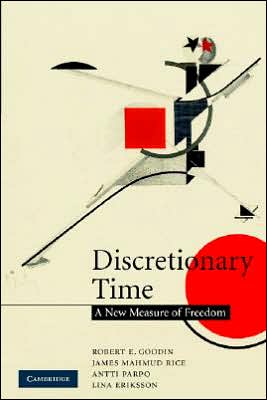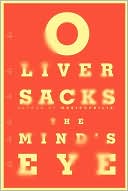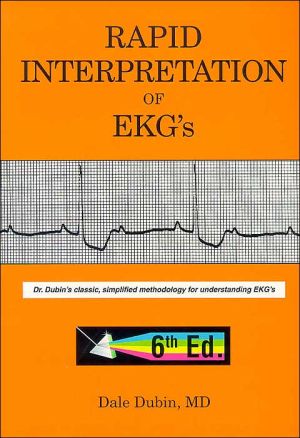Discretionary Time: A New Measure of Freedom
A healthy work-life balance has become increasingly important to people trying to cope with the pressures of contemporary society. This trend highlights the fallacy of assessing well-being in terms of finance alone; how much time we have matters just as much as how much money. The authors of this book have developed a novel way to measure 'discretionary time': time which is free to spend as one pleases. Exploring data from the US, Australia, Germany, France, Sweden and Finland, they show that...
Search in google:
A novel study of how much control people have over their time and work-life balance.
Cambridge University Press\ \ 9780521882989 - Discretionary Time - A New Measure of Freedom - by Robert E. Goodin, James Mahmud Rice, Antti Parpo and Lina Eriksson\ \ Excerpt\ \ \ \ \ \ \ PART I\ Introduction\ \ \ \ \ \ \ \ 1 Time and money\ 1.1 Time matters\ Recent theorizing about politics has been characterized by a quest for an appropriate ‘currency of egalitarian justice’.1 Time has some very special properties that combine to make it a particularly apt candidate for that status.2\ \ Time is inherently egalitarian. Everyone has just 24 hours in a day. Some people may value time more than others.3 Still, an hour is the same for everyone, everywhere. That makes it a natural metric for social comparison.\ Time is inherently scarce.4 No one has more than 24 hours in a day. Some people’s projects are more time-consuming than others’, and some people’s lives last longer than others’. Still, virtually everyone agrees that more time would be better.5 That makes time a resource that is always scarce relative to demand.\ Time is a necessary input into anything that one cares to do or to become.6 Some people make better use of their time than others, getting more done in the same amount of time. Still, everyone needs some time to do or become anything. That makes time a universal good.\ \ Those facts combine to make ‘time’ a particularly aptcurrency for egalitarian justice.7\ What we ought to be concerned with, more precisely, is the just distribution of control over the resource of ‘time’. When we say that someone ‘has more time’ than someone else, we do not mean that she has literally a twenty-fifth hour in her day. Rather, we mean to say that she has fewer constraints and more choices in how she can choose to spend her time. She has more ‘autonomous control’ over her own time. ‘Temporal autonomy’ is a matter of having ‘discretionary control’ over your time.8\ We offer more elaborate definitions and more precise operationalizations in chapter 2 below. The basic idea, however, can be simply stated. There is a ‘realm of necessity’, in which there are certain things you simply have to do.9\ \ You have to satisfy bodily necessities: you have to spend at least a minimal amount of time eating, sleeping and otherwise taking care of your body.\ You have to satisfy financial necessities: you have to spend at least a minimal amount of time securing the cash that you need to purchase the things you need from the cash economy.\ You have to satisfy household necessities: you have to spend at least a minimal amount of time cooking, cleaning, taking care of the kids and otherwise keeping your household functioning.\ \ Exactly how much time you have to spend in each of those sorts of activities is something we will be calibrating over the course of this book. For now, let us just agree that it is necessary to spend at least a certain amount of time in those necessary activities of daily life.10 The time beyond that necessary to attend to necessary functions is yours to use as you please. That is what we will call ‘discretionary time’. That is how much ‘temporal autonomy’ you possess.11\ Note that ‘necessity’ here relates to a social standard, not a natural one. It is not literally impossible for people to do less in each of these dimensions; indeed, as we shall see in chapter 2, around a tenth of people do so in each of these three dimensions on the operationalizations we have chosen. Then again, it is perfectly proper that we do not set our poverty line so low that literally no one in the country falls below it (convenient though politicians might find that). The poverty line demarcating what is ‘necessary’, in money and all these other dimensions as well, represents not a threshold below which it is physically or logically impossible to fall. Just as people sometimes fall below the threshold of financial necessity and are in poverty, people sometimes fall below the threshold of household necessity (and are prosecuted for child neglect) or below the threshold of bodily necessity (and are sleep-deprived). The poverty line represents instead a threshold below which it is socially unacceptable to let people involuntarily fall.12 People falling below those thresholds are simply not satisfying crucial preconditions for participating fully in the life of their society.13\ When saying that it is socially ‘necessary’ for people to spend a certain amount of time in a certain activity, we mean merely that socially it is only to be expected that they should do so, and that they are not socially criticizable insofar as they do. People are responsible for what they do with their discretionary time, in a way they are not for spending the minimum amount of time that is socially necessary on necessary activities of daily life. That is the respect in which we deem of the one a ‘choice’ and the other a ‘necessity’.\ The amount of discretionary time left over, after deducting the strictly minimal amount of time devoted to those necessary activities, is greater for some people than others. It is greater in some sorts of households than others. And it is greater in some sorts of countries than others. Here we undertake a cross-national examination of how discretionary time and temporal autonomy vary across the three classic welfare-gender regimes: the social-democratic welfare regime and female-friendly gender regime exemplified in our study by Sweden and Finland; the corporatist welfare regime and traditionalist gender regime exemplified by Germany and France; and the liberal welfare regime and individualist gender regime exemplified by the US and Australia.\ In the next chapter, we describe and defend our operationalization of temporal autonomy through the notion of ‘discretionary time’. In part II, we show that that notion is distinct from, and as a measure of temporal autonomy it is superior to, more familiar notions of ‘spare time’ (or ‘free time’ or ‘leisure time’). People typically work far longer hours in paid labour than they would strictly need to do purely in order to escape poverty. It is perfectly reasonable that they should do so. When they do, however, they come out looking time-poor on those more familiar notions. But that cannot be right. By definition, ‘avoiding poverty’ defines the limits of strict necessity. Insofar as people work longer hours than strictly necessary for that, purely by their own choice (because they prefer a higher income than the minimum necessary), that should be seen as an exercise of their temporal autonomy, not a constraint upon it. Welfare economists equate ‘welfare’ with ‘being in a chosen position’. By that standard, people who work longer hours by choice rather than necessity should be regarded as having more welfare, not less. Our notion of ‘discretionary time’ tracks those intuitions well, whereas ordinary measures of time pressure couched in terms of ‘spare time’ and its cognates do not.\ In parts III and IV of the book, we look across our six countries to try to surmise what differences the different sorts of existing social policies there actually make to people’s temporal autonomy. Part III concerns the impact of different welfare regimes on people’s temporal autonomy, and part IV concerns the impact of different gender regimes.\ In part V of the book, we try to surmise how people’s temporal autonomy might differ depending on how their household is organized. We explore the effects of different rules for governing one’s household through a series of counterfactual thought experiments, projecting the same population first into one household regime (households run on one sort of rule), and then into another. We also show how different states’ differing social policies exacerbate or alleviate the differences that different household regimes make to people’s temporal autonomy.\ How exactly these three regimes interrelate with one another is an open question meriting much further investigation, using a variety of other techniques. Our speculation is that state policies operating on and through choices among ‘household regimes’ constitute micro-foundations, certainly of the ‘gender regimes’ and even of certain aspects of the ‘welfare regimes’. That is to say, we speculate that a different mix of household-sharing rules would be found in different gender and welfare regimes; and that those differences are traceable, in turn, to the different styles of each of those gender and welfare regimes. But different data and different styles of analysis would be required to test those speculations. For the purposes of the present work, we will simply treat ‘welfare regimes’, ‘gender regimes’ and ‘household regimes’ as three distinct influences on people’s temporal autonomy.\ To foreshadow, our findings will be that the most important influences on people’s temporal autonomy are life-cycle changes: marrying, having children, divorcing. The main impacts of welfare states, gender regimes and household regimes on people’s temporal autonomy come by making those life-cycle changes more or less costly, in time terms. Those impacts are often substantial, and can vary substantially across the different regime types.\ 1.2 Measuring rods: time and money\ The sources of human satisfaction and dissatisfaction are many and varied, within any given individual’s own life and across individuals. Economists try to render all those multiple contributions commensurable through ‘the measuring rod of money’.14 Economists value things that are literally bought and sold directly at their sale price. But many things of value to us are not bought and sold.15 Economists bravely persist in trying to bring them ‘indirectly into relation with the measuring rod of money’ through ingenious techniques of ‘shadow pricing’.\ There are various familiar problems with economistic attempts to bring all human values – even just everything we comfortably regard as ‘goods and services’16 – under the measuring rod of money. We rehearse some of them briefly in section 1.2.1 below, by reference to the particular problem of valuing the unpaid household labour involved in what economists call ‘home production’. That is a productive contribution of a relatively straightforward sort.17 Economists in the OECD and in various national statistical offices agree it ought to be included somehow in the National Accounts statistics. The difficulties they encounter in bringing even that under the measuring rod of money is a harbinger of even greater troubles to come in applying their measuring rod yet further afield.\ The measuring rod of money is not the only one possible. A ‘measuring rod of time’ could serve as an alternative metric.18 In many ways it is a more natural metric. As we have already observed, everyone has exactly 24 hours in a day. If our aim is to render things commensurable in welfare terms, then looking at how much time they cost people (or how much time people are willing to devote to them) might be one very good way to do so.19\ From one angle, this might seem a highly novel suggestion. From various other angles, however, it is a very familiar one.\ \ Think of criminal sentencing. We are quite accustomed to calibrating the badness of criminal acts in temporal terms, ‘jail time’. In certain jurisdictions, even non-custodial criminal penalties are expressed in temporal terms, with a person’s fine explicitly being expressed in terms of a certain number of days’ wages (section 1.2.2).\ Think of anti-tax rhetoric. Right-wing organizations talk about how much time it takes to earn enough to pay your tax bill for the year. They acidly observe that you spend longer working for the government than you do paying off your mortgage. Translating tax dollars into temporal terms in these ways is a powerful, and familiar, rhetorical trope (section 1.2.3).\ Think, finally, of ‘time poverty’. We all know about the ‘working poor’, people whose wages are so low that they cannot escape poverty even working full-time. There are also people who manage to avoid being ‘money poor’ only by making themselves ‘time poor’, working terribly long hours often in multiple jobs. Looking at poverty in a joint time-and-money framework reveals important differences in how different socio-economic regimes impact on people’s welfare (section 1.2.4).\ \ Each of those examples will be elaborated further below. Taken together, those familiar ways of talking and thinking should serve to remind us that there often are both temporal and monetary metrics that can be used in assessing social arrangements of concern to us. They should further serve to remind us that the ‘measuring rod of time’ can be superior to the ‘measuring rod of money’ for many purposes. In the next chapter we will suggest another way of systematically combining both time and money under a temporal metric – one that in our view best captures the notion of ‘temporal autonomy’ and welfare associated with it.\ 1.2.1 Factoring home production into the National Accounts\ The National Accounts are supposed to be a comprehensive measure of all economic activity within the country. What they actually measure are cash flows. Anything that is not bought and sold for money is not automatically counted in ordinary National Accounts statistics. Any goods exchanged in barter, in the formal or informal economy, are typically left out. So too is anything produced for one’s own consumption. So too are the goods and services produced and consumed within the household. All these things are typically largely missing from National Accounts. But it is quite wrong to suggest that they are of no value, even in a narrowly economic sense.20 ‘All of these activities are productive in an economic sense’, as the UN Statistics Office is the first to concede in its 1993 update of the System of National Accounts.21 Furthermore, it would be quite wrong to imagine that the magnitudes involved are small. One early calculation suggested that, if all married men divorced their wives and hired them back as housekeepers, National Income would double.22\ Economists are anxious over the vast amounts of unpaid household labour that does not, but really ought to, get counted in National Accounts statistics.23 The OECD has been actively developing ways\ \ \ © Cambridge University Press
List of figuresList of tablesPt. I Introduction1 Time and money2 Discretionary time3 The distribution of discretionary timePt. II Time Pressure4 Time pressure: a new problem?5 Time pressure: a new measure6 Is it really an illusion?Pt. III Welfare Regimes Matter7 How welfare regimes differ8 A temporal perspective on welfare regimes9 Welfare regimes and temporal autonomyPt. IV Gender Regimes Matter10 How gender regimes differ11 A temporal perspective on gender regimes12 Gender regimes and temporal autonomyPt. V Household Regimes Matter13 How household regimes differ14 The difference that household rules make15 The difference that states make16 Alternative household rules and temporal autonomyPt. VI Conclusions17 ConclusionsAppendix 1 MethodologyAppendix 2 Data








